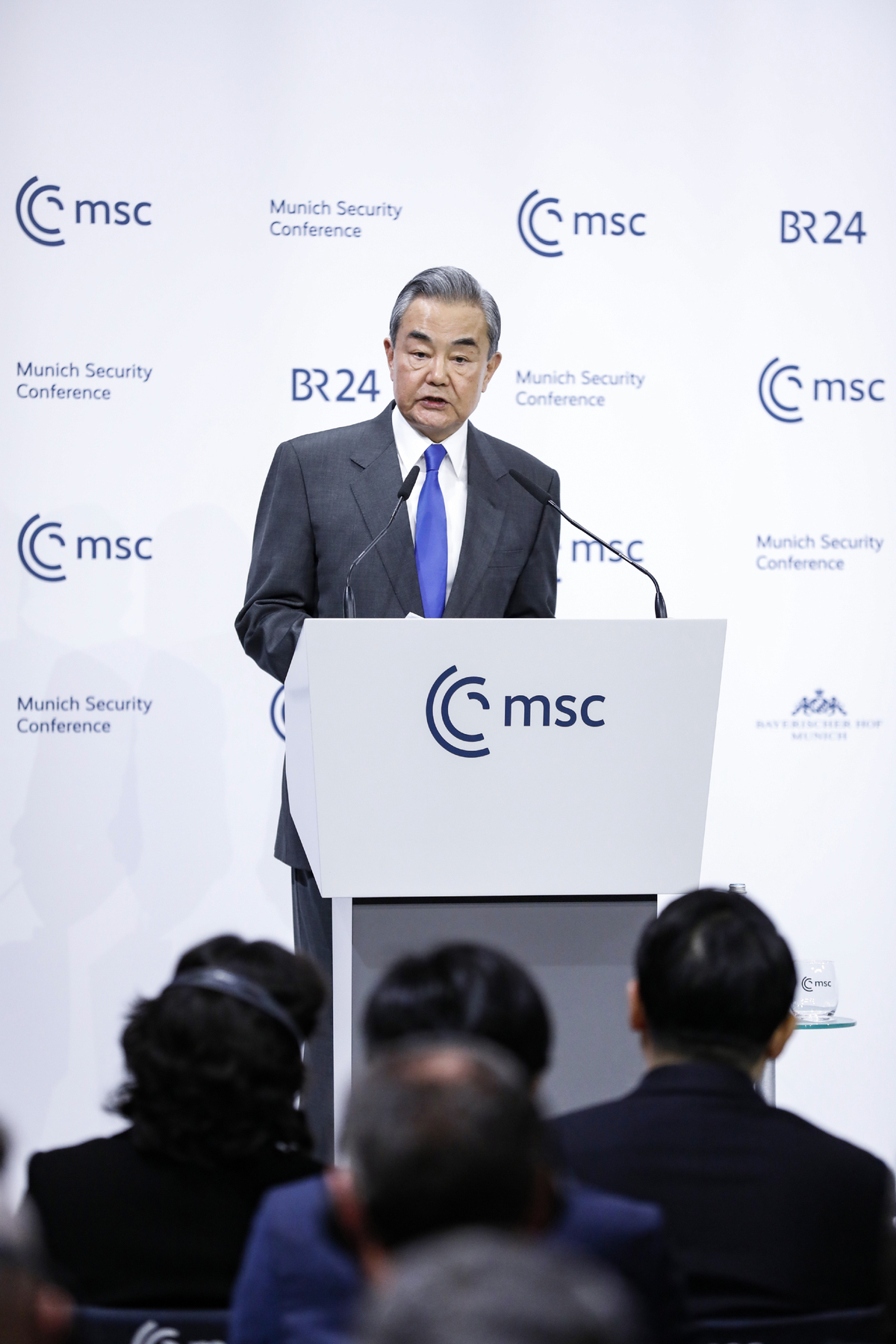在动荡和变革的世界中,中国是确定性的源泉 - 2025-02-17

Chinese Foreign Minister Wang Yi, also a member of the Political Bureau of the Communist Party of China Central Committee, addresses the "China in the World" session of the Munich Security Conference in Munich, Germany, Feb 14, 2025.
The world is rapidly changing, and it is once again experiencing the turbulence of transformation. As in days gone by, people are trying to read the signs to divine what shape the future will take.
For the authors of the Munich Security Conference report the auguries are clear, the world is becoming multipolar. But unlike those who see hope and promise in such a transmutation, the report offers a bleaker assessment, focusing on the birth pains that have become increasingly prominent, such as rising divisions between major powers and conflicts over differing order models that are hindering unified responses to global challenges.
In response, the report advocates for "depolarization", emphasizing the necessity for significant reforms within the international order to address these issues.
In his speech at the international security forum on Friday in Munich, Chinese Foreign Minister Wang Yi, who is also a member of the Political Bureau of the Communist Party of China Central Committee, offered a more sober view from Beijing's perspective, pointing out that it is the resistance to change that is the cause of the strife of upheaval.
Wang made it clear that it is "the we-first approach" adopted by some countries, which he politely didn't name, that is the cause of the current "incessant chaos and confusion" in the world, as "they believe might makes right and have opened a Pandora's box marked the law of the jungle".
For the benefits of multipolarity to be manifest, it is important, as the Chinese foreign minister said, that all countries practice true multilateralism. In the face of emerging global challenges, no country can stay unaffected.
China agrees that reform of the global system is needed. But the reforms should be to make it inclusive and fair, and to enable it to address the development, governance, security and trust deficits that plague the world.
Beijing has repeatedly called for the United Nations to be at the core of practicing multilateralism, and Wang said that it is essential to "cement its foundations rather than destroy its pillars".
As he pointed out, all countries, regardless of size or strength, are "stakeholders in the international rule of law". The multipolar paradigm will only be in a state of disarray if some countries adhere to double standard in observing international law, saying one thing and doing another.
Unlike the self-serving and exclusive security concept pursued by some Western countries, China points to the right direction for building a more secure world for all.
It upholds true multilateralism and advocates for the building of a community with a shared future for humanity.
China's goal is to build an open, inclusive, clean and beautiful world of lasting peace, universal security and shared prosperity. The pathway to this is promoting global governance that features extensive consultation and joint contribution for shared benefit; with the Global Development Initiative, the Global Security Initiative and the Global Civilization Initiative providing the strategic guidance, and high-quality cooperation under the framework of the Belt and Road Initiative the platform for action.
A multipolar world has become an unstoppable trend. For too long, the existing international order has been shaped disproportionately by a handful of Western powers, which have sidelined the voices and needs of developing nations.
From Iraq to Afghanistan, from Gaza to Ukraine — to name only some — the unipolar world upheld by the US-led West is one of bloodshed and suffering.
Yet, it seems — as shown by the meeting between US Secretary of State Marco Rubio and Philippine Foreign Affairs Secretary Enrique Manalo on the sidelines of the Munich forum, indicating the US will continue with its friction-causing meddling in the South China Sea — that the US and its club of allies and partners in the "Indo-Pacific" have no intention of reflecting upon their security perception which only sows the seeds of confrontation and division.
Amid the profound global changes and challenges, no country can look on with folded arms. As China's top leader has urged, countries should plan together, build together and benefit together.
By practicing true multilateralism, featuring extensive consultation and joint contribution for shared benefit, China is the source of the greatest certainty amid all the turbulence and uncertainty, as it is a "steadfast constructive force" upholding the trajectory toward an equal and orderly multipolar world.
Source: China Daily
